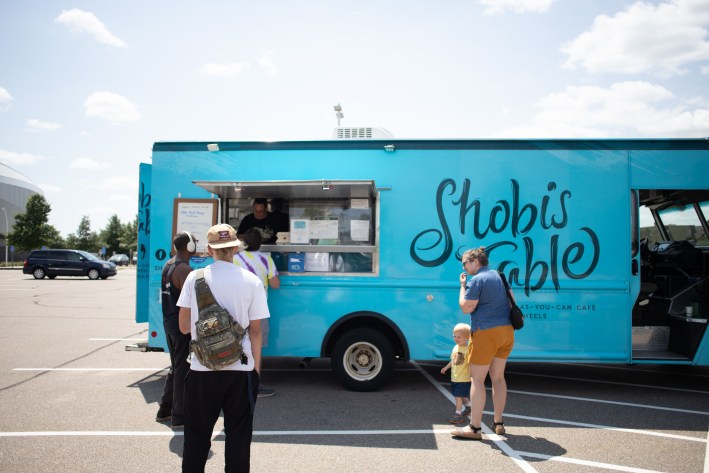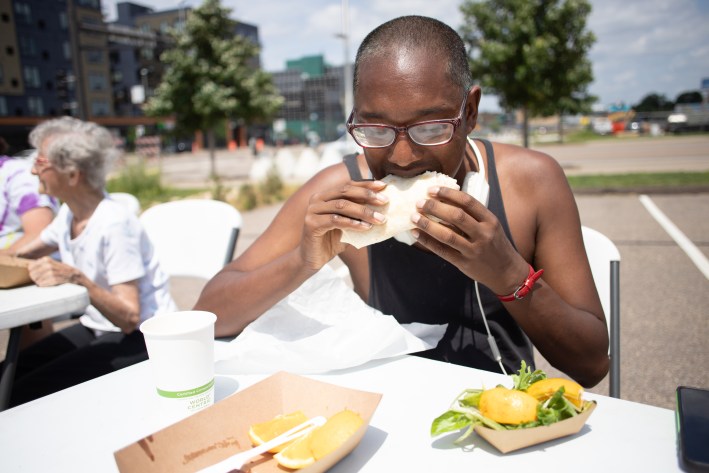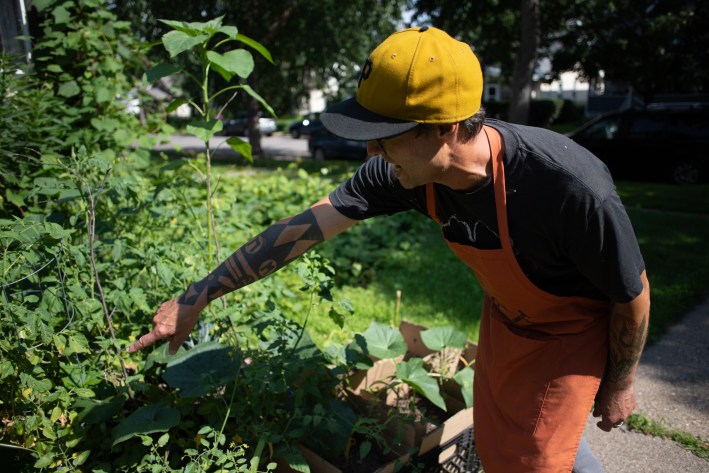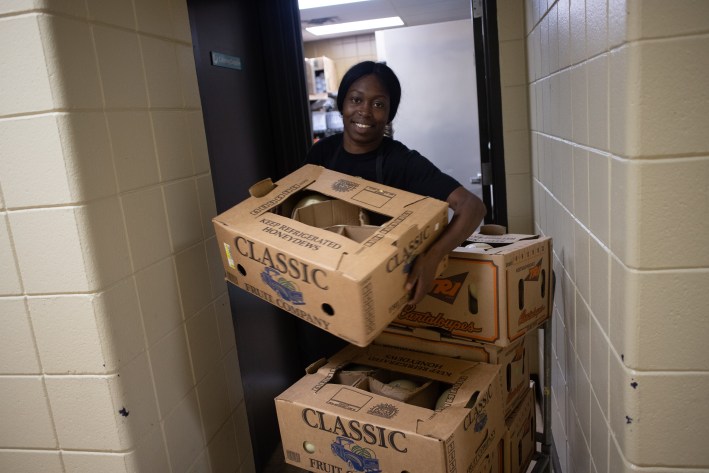The journalism industry hasn’t been doing well lately, and I've got the bank statements to prove it.
In addition to declining work opportunities, two of my publications were late on paying my invoices this summer. (I can assure you that Racket is not one of them!) Add in a demanding schedule—applying for jobs, working on stories, and attempting to decompress from doing the two—and I have little time to cook. Combined with ongoing inflation, it all means I’ve gone to a few places to get free meals on and off over the past three months.
I’m not the only one who’s struggling. The Food Group's Hunger Solutions found 7.5 million food shelf visits in Minnesota in 2023—2 million more visits than in 2022. According to the University of Minnesota’s Food Security Dashboard, food insecurity has surged by as much as 40% since 2020.
“Just even for myself, groceries have gone up so much,” says Daniele Maeder, development associate at pay-as-you-can food truck Shobi’s Table. “It's a huge expense just to feed yourself, even if you're working and stable and have housing and [are] middle class or whatever.”
Maeder, along with many of those who distribute free or low-cost meals to those in need, has seen demand go up since the pandemic began, and it has remained high as pandemic-era programs that provided support eventually came to an end.
I’ve tried to be a vegetarian on and off over the past decade, in part because having lots of animal parts inside of me makes me sleepy and sad, and in part because I’m concerned about the impact of raising and eating meat on climate change. And one thing I noticed as I visited various free meal providers over the last few months is that diet-specific options aren’t widely available. (For example: A recent meal I had at Loaves and Fishes consisted of a piece of chicken, a tangerine, and a slice of watermelon.)
In San Francisco, where I grew up, a group named Food Not Bombs served vegetarian meals on a weekly basis. I wondered: Were groups doing that here in the Twin Cities? What about if you’re a vegan, or lactose intolerant, or gluten free? Or if you stick to a halal diet, or a kosher one?
The Vegetarian Meals
The Twin Cities has a couple of places that distribute free or pay-what-you-can vegetarian meals. Cafe Racer in Minneapolis’s Seward neighborhood does so on the last Monday of the month, as well as if someone phones in for a “Break Bread” meal during business hours. And the Minnesota Chapter of the Buddhist Tzu Chi foundation, a Taiwan-based humanitarian disaster-relief organization akin to the American Red Cross, distributes meals about every month at St. Gabriel the Archangel church in Hopkins, as well as to those staying at the Simpson Housing Services shelter in Minneapolis’s Lyndale neighborhood bimonthly.
Then there’s Shobi’s Table, a ministry of the St. Paul Area Synod of the Evangelical Lutheran Church. Every Friday from noon to 1 p.m., Shobi’s blue food truck is parked on a parking lot west of Allianz Field, adjacent to Snelling Avenue.
Shobi’s Table started in 2014, serving calzones while preaching to those who eat. In 2023, the truck served 6,569 meals over 140 days, up from 4,740 meals over 115 days the year prior. They expect to serve close to 10,000 meals this year.

A recent visit to Shobi’s found no preaching. Instead, people—including artists, neighbors, and even a professional translator—congregated with one another as they waited for their order of a barbecue wrap filled with beans, beef, and vegetables, served with coleslaw, orange slices, and a brownie. Here, people pay what they wish.
Maeder says the group focuses on filling their foods with vegetables to stretch the meat that they serve. To make a vegetarian meal, they simply don’t put meat in it. To pull it all off, Shobi’s Table gets funding from grants and donations, along with food from Twin Cities Food Justice.
“It’s not about giving calories to poor people. It's about feeding everyone who comes to the table with the dignity of a restaurant experience,” Maeder says. “If you have dietary restrictions, and you go to a restaurant, they're going to take care of you and give you what you need. If you’re gluten-free or vegetarian, it's important to us to make sure that everybody gets what they need.”
Veronica Dubose recently started eating at Shobi’s again after being discharged from her work. Sometimes she has the vegetarian option, where the wrap is made without beef. She thinks she likes it.
“Maybe it's just you're getting the freshness of veggies and you're getting to enjoy that taste that's not overpowered by the meat,” she says.
Paul O’Connell, a disabled artist who relies on Social Security for income, also appreciates having a vegetarian option, in part because they have a light dairy allergy.
“I can only have a small amount of dairy … I just get sick [if I eat too much],” O’Connell says over lunch, adding that the vegetarian option is plenty filling. “It doesn't feel like it's like an afterthought, like, all about what can we throw together.”

O’Connell also gets meals every Tuesday from the basement of Zion Lutheran Church in St. Paul’s Hamline-Midway neighborhood. Colin Anderson, the chef of Eureka Compass Vegan Foods, decided to close the restaurant and vegan grocery store and, in December 2021, established the Twin Cities Vegan Chef Collective. The group cooks and serves vegan meals—which are also gluten free, nut free, and corn free—at the church, which sits across the street from where his vegan restaurant used to be.
“Retail is dead. Capitalism is violence,” Anderson says of why he decided to close the restaurant. “Anybody who's still operating in that is operating, probably, in inherently violent and disparity-riddled exploitative ways.”
Funding and Food Availability—a Challenge in Meeting Dietary Restrictions
Anderson is able to serve free meals thanks to help from those who pay what they can at meal service and those who contribute to the collective’s Patreon. The Patreon has 309 members who contribute a total of $2,294 per month.
Last month, he announced that the collective had been accepted into the Minnesota Department of Agriculture’s Local Food Purchase Assistance Program, which comes with $122,000 in grants. The collective is looking to raise an additional $150,000 to purchase produce and pantry items.
On a recent Tuesday, Anderson served up baked sweet potatoes and zucchini; a melt-in-your-mouth white bean stew with roasted radishes and kohlrabi; a stew of organic collards, shredded carrots, and sauteed onions; and a salad of collards, kale, cucumbers, radish greens, peppers, and yellow tomatoes. For dessert, there was a cranberry gelée topped with a slice of candied orange.

All the foods he cooked were sourced locally. Some came from the Midway Food & Empowerment Project, while others came from the Community Homestead farm in Osceola, Wisconsin, the Hamline University Food Resource Center, and Anderson’s garden. Some more came from area food shelves.
He says people from all walks of life appreciate his cooking.
“There are definitely food insecure folks who have come in and have acknowledged that they really appreciate it, it's vegan, that they would like to eat that,” Anderson says. Some come here for the community, while others simply need to eat.
One thing you won’t often find at the Tuesday Vegan Chef Collective meals are meat substitutes, such as tofu and other plant-based “meats.”
“That’s not a reliable thing. We only get tofu or tempeh because we buy it,” says Jules Schauffler, one of the volunteers who helps Anderson prepare meals at Zion.
At Tzu Chi Minnesota, director Jenny Pan (no relation to the author) says finding ingredients to cook vegetarian meals can also be a challenge. “Sometimes we need cabbage—they don’t have cabbage. We need to go to a grocery store like Aldi to buy the things we need,” she says, adding that donations from members fuel those purchases.
Lindsey Ochmanek, director of sourcing and demand planning for the hunger relief organization Second Harvest Heartland, says that vegan and halal foods are hard to find and expensive to acquire.
“A lot of those [foods that adhere to] more specific dietary requirements aren't items that we’re getting donated, and aren't items that necessarily come through a retail rescue very frequently, or in any meaningful amounts,” she says. “What that means is that we are purchasing more product to fill those gaps. Some of those items can be more expensive, like halal meat.”
Created from the 2001 merger of the Minneapolis and St. Paul food banks, Second Harvest Heartland secures its food from manufacturers or wholesalers who have extra, and from farmers and grocery and convenience stores with whom the nonprofit has an agreement.
“The idea is to make sure that we capture any excess product that is available out there that is still healthy and nutritious, but maybe is too close to code date to be sold, or maybe just doesn't meet certain [visual] quality standards that the retailer may have,” Ochmanek says.
The reported receipt of sub-quality foods, which Anderson believes is insulting and symptomatic of more people eating out less and buying food at grocery stores, is part of why Eureka Compass stopped relying on Second Harvest for food as of March. Anderson also dislikes the reporting and nutrition requirements the Twin Cities Vegan Chef Collective is subject to as a stipulation of accepting donations from Second Harvest Heartland. “A lot of it is… you know, like protein, you have to have, like, this much protein offered per person,” he says.
Ochmanek believes Second Harvest Heartland is flexible with nutrition requirements, and also says the nonprofit wants to ensure food is handled at “properly maintained temperatures. We have practices and protocols in place to ensure the safety of the food. Our agency partners work really hard to try and ensure that they're able to meet the nutritional needs of their specific communities.” They also track the amount of pounds collected from their retail partners and distributed into the community.
Catholic Charities Twin Cities, which serves meals at their centers in St. Paul and Minneapolis, serves an average of 3,000 meals and snacks per day across six sites in Minneapolis and St. Paul. Sixty percent of the food they source to cook their meals comes from food banks such as Second Harvest Heartland. Though the charity is able to accommodate dietary needs at sites where they have an intake process, like at shelters, there are challenges with doing so at drop-in sites, such as the St. Paul Opportunity Center.
“At each meal where pork is on the menu, we provide a pork alternative,” Pamela Hagen of Catholic Charities Twin Cities writes via email. “We also provide a variety of non-meat side dishes and salads for client choice. Given that we have limited public financial support for these large drop-in meal programs, meeting all other possible dietary needs has proven to be challenging.”

Pillsbury United Communities serves free meals up to four times a week at their community centers in north and south Minneapolis. Chef DeeDee Fuller, who has worked as a chef at Pillsbury United Communities’ Oak Park community center for over a decade, serves 450 meals a day across both centers, amounting to close to 1,500 meals a week. At a projected 78,000 meals this year, it’s a drastic increase compared to 2019, when they served 20,000 meals, according to their tax disclosure forms.
Though Pillsbury United gets food from Second Harvest, the organization also purchases food from a number of restaurant vendors, including Sysco and Restaurant Depot. “The donated food helps us with our budget. It just helps us buy more or better food for the community,” Fuller says, as she moves boxes of food in the pantry of the Waite House, the south Minneapolis site located in the Phillips Community Center.
Both sites have different nutritional requirements because of where the funding comes from, which influences whether or not they’re able to serve vegetarian meals. Fuller has more flexibility to provide vegetarian and halal options at the Oak Park center, in part because the nutrition requirements are more loose and the meals are mostly served cafeteria-style. “I don’t serve pork over there,” she says. “ There, we make all the meals one at a time. So you can easily say, ‘hey, for mine, no meat, or no salad, or no bread.’”
Meanwhile, meals served at the Waite House are subject to more nutrition requirements.
“This one is definitely more regulated than I am over in north Minneapolis,” Fuller says. “Basically, making sure we have the calcium, the milk, that we have a starch, fruit, and a veggie every day, and then we have the main meal.”
Staff time is also a factor in whether or not Pillsbury’s chefs are able to prepare a vegetarian, vegan, or halal meal at the Waite House location. “Here, we make all the meals to-go ahead of time,” Fuller says.
Shobi’s Table does not have any dietary requirements they have to adhere to, “But we do think about things,” Maeder says. “So if it's a vegetarian, we make sure that it's a complete protein. For example, mac and cheese. Or you make sure there are lentils or beans or something, so that you're getting what you need.”
Symptoms of a Larger Problem?
Anderson and Second Harvest Heartland may disagree on the best approach to solve hunger, but there’s one thing they agree on: Capitalism is making people go hungry.
“You're going to appeal to the most basic, self destructive, immediate gratification. People are starving to death,” Anderson says. “The privileged and vain are consuming and wasting our dwindling agricultural resources on entirely unnecessary progress, satiating vanities and abuses. And then we are also burning our future shipping nourishment to where nourishment already exists.”
Adds Ochmanek: “If we think about how volatile supply chains are, you know how consumer preferences change over time, how the pricing of certain products has impacted the demand for them, all of those open up sort of the opportunity for there to be food waste. Food is generally overproduced in our country. And that's to kind of hedge on some of those challenges that companies are managing and be able to ensure that there's enough.”
In February, Second Harvest Heartland convened a coalition of religious, housing, and transportation advocacy organizations to fight for housing, zoning, and Medicaid reform, affordable childcare, as well as free public transit so people can get to grocery stores to buy food.
“Rents increasing, mortgages becoming more expensive, people spending more on basic needs, food budgets are often the first things that get cut, and if they can’t afford groceries, then they end up at a food shelf,” says Zach Rodvold, Second Harvest Heartland’s director of public affairs.
But Anderson believes we need to start growing, sourcing, and serving our food locally, instead of fueling the nonprofit industrial complex. (Second Harvest Heartland’s CEO made $684,000 in 2023, per tax docs.)
“We’re in the [climate] collapse now. Stop ignoring the meteor in the sky and begin preparing for life after impact,” Anderson says. “What communities need is not these giant destination places, but accessible resources, like every 10 blocks. [We need to make] sure our communities are as secure and stable for that as possible. As fast as Minnesota can feed Minnesota, the better off we'll all be.”
Vegetarian, vegan, and halal-friendly meal options
Minneapolis
- Cafe Racer: Last Monday of the month, 11 a.m. to 1 p.m., 2929 E. 25th St. or call ahead
- Pillsbury Oak Park: Tuesday - Thursday, 4 to 6 p.m., 1701 Oak Park Ave. N.
- Indigenous Food Lab at the Midtown Global Market: Monday - Saturday, 10 a.m. to 6p.m. 920 E Lake St. Ask for a "Community Meal."
St. Paul
- Shobi’s Table: Tuesday - Friday, 12 to 1 p.m., various locations in St. Paul
- Eureka Compass at Zion Lutheran Church: Tuesdays 11 a.m. to 8 p.m., 1697 Lafond Ave.
- J. Selby's: Wednesdays - Sundays, 11 a.m. to 8 p.m. 169 N. Victoria St. Call ahead to order a "Community Bowl" at 651-222-3263.
Hopkins
- Tzu Chi Minnesota at St. Gabriel the Archangel: Call Loaves and Fishes at 612-377-9810 to confirm date and time, 1310 Mainstreet in Hopkins






